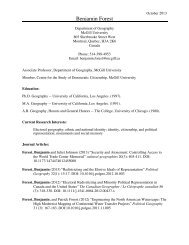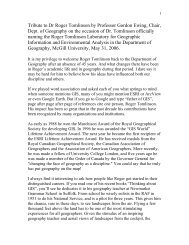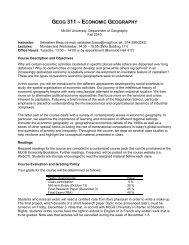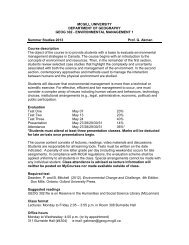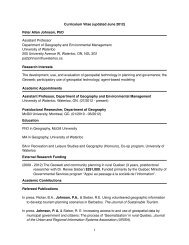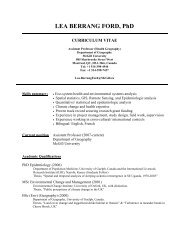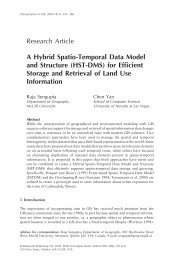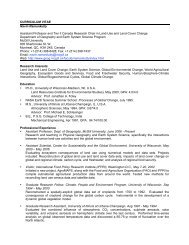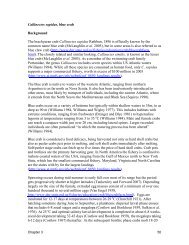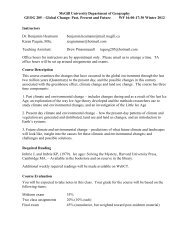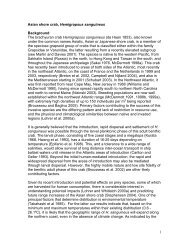Dear Diary - Department of Geography, McGill University
Dear Diary - Department of Geography, McGill University
Dear Diary - Department of Geography, McGill University
- No tags were found...
Create successful ePaper yourself
Turn your PDF publications into a flip-book with our unique Google optimized e-Paper software.
Journal <strong>of</strong> <strong>Geography</strong> in Higher Education,Vol. 35, No. 1, 67–83, February 2011<strong>Dear</strong> <strong>Diary</strong>: Early Career GeographersCollectively Reflect on Their QualitativeField Research ExperiencesDownloaded by [<strong>McGill</strong> <strong>University</strong> Library] at 10:28 08 October 2011ELIZABETH HELLER, JULIA CHRISTENSEN, LINDSAY LONG,CATRINA A. MACKENZIE, PHILIP M. OSANO, BRITTA RICKER,EMILY KAGAN & SARAH TURNER<strong>Department</strong> <strong>of</strong> <strong>Geography</strong>, <strong>McGill</strong> <strong>University</strong>, CanadaABSTRACT After completing a qualitative methods course in geography, we moved classroomdiscussions into practice. While undertaking graduate fieldwork in sites across the globe, weparticipated in critical, reflexive journaling. Whereas journal writing is <strong>of</strong>ten private, we shared ourentries, aiming to facilitate rigour while concurrently exploring similarities and differences.We became conscious <strong>of</strong> common themes including ethical dilemmas, power relations andresearcher fatigue. In this paper, we critically analyse these experiences, examining the strategiesimplemented to resolve such predicaments. We argue that reflexive group journaling duringfieldwork is a valuable learning tool which could be introduced into many research-active curricula.KEY WORDS: Fieldwork, journal writing, student voice, ethics, gatekeepers, researcher fatigueIntroductionUpon completing a qualitative methods course designed for Masters’ and Doctoralstudents in human geography, we decided to move theory beyond the classroom and intopractice. During 2008, we undertook reflexive journal writing while undertaking thesisfieldwork in sites as diverse as India, Vietnam, Uganda, Kenya, Barbados and Canada toexplore commonalities and differences across field experiences. Additionally, we wantedto facilitate rigour within our research projects by using field journals as reflexive tools(cf. Baxter & Eyles, 1997). Our aim was not necessarily to get ‘better data’, but rather todo ‘better research’ (Pillow, 2003).In geographic literature, journaling is increasingly discussed as a means to promoteactive student learning on undergraduate field trips and to facilitate course assessment(see Harrison et al., 2003; Park, 2003; McGuinness & Simm, 2005; Dummer et al., 2008;McGuinness, 2009). However, we were interested in how group journaling could developand enrich field experiences, and reflections upon these, for students undertaking graduateresearch. While typical journal writing practice is individual and isolated, we committedourselves to share our entries as a group upon returning from the field (communicationCorrespondence Address: Julia Christensen, <strong>Department</strong> <strong>of</strong> <strong>Geography</strong>, <strong>McGill</strong> <strong>University</strong>, 805 Rue SherbrookeOuest, Montréal, Québec H3A 2K6, Canada. Email: julia.christensen@mail.mcgill.caISSN 0309-8265 Print/1466-1845 Online/11/010067-17 q 2011 Taylor & FrancisDOI: 10.1080/03098265.2010.486853
68 E. Heller et al.Downloaded by [<strong>McGill</strong> <strong>University</strong> Library] at 10:28 08 October 2011difficulties limited us from doing so during fieldwork). As such, we could benefit fromcollective reflection, debate and deliberation. Concurrently, the mutual newness <strong>of</strong> ourexperiences facilitated an important level <strong>of</strong> honesty with one another and ourselves.We became aware <strong>of</strong> both the changes we experienced as researchers and individuals, anda number <strong>of</strong> common challenges woven through our diverse field experiences.In this paper, we critique a range <strong>of</strong> research situations and the field ‘survival’ skills thatemerged from our group journaling experience that could be usefully incorporated into thereflexive practices <strong>of</strong> other apprentice researchers. The lessons culled from our journalentries relate to ethical dilemmas, particularly in cross-cultural contexts; power relations,especially the role <strong>of</strong> gatekeepers; and the impact <strong>of</strong> fatigue on the researcher. This articletherefore has two aims: first, to act as a starting piece for classroom discussions regardingthe importance <strong>of</strong> reflexive practices and social justice considerations when consideringthe practicalities <strong>of</strong> fieldwork and second, to reveal the possibilities <strong>of</strong> a new model <strong>of</strong>group journaling for graduate student field-researchers.Next, we detail the group journaling methods that we utilized. Then, from an analysis <strong>of</strong>our journal entries, we explore common and contrasting experiences that group membersencountered while undertaking field research, each followed in turn by the solutions weattempted to enact. Finally, we discuss the importance <strong>of</strong> journaling as a process in thefield, exploring how it supports the practice <strong>of</strong> reflexivity and strengthens research rigour,while also providing a place for us to vent our frustrations, face our fears and document ourgrowth.MethodsFollowing the completion <strong>of</strong> our qualitative methods course, seven <strong>of</strong> the eight studentsplanned to undertake graduate fieldwork in the second half <strong>of</strong> 2008. As the course drew toa close, we realized that continuing our classroom discussions in the field could beenlightening. We agreed to individually document our field experiences, paying particularattention to themes discussed in class, and then share our journal writing with one anotherupon fieldwork completion (while respecting research participant confidentiality).Through our methods course, we had developed a strong rapport among group membersand with the pr<strong>of</strong>essor, making us open to trusting one another with our personal, honestreflections during fieldwork. All eight students and the pr<strong>of</strong>essor participated in theproject, although with different roles. Journals were kept by the seven students entering thefield, while Emily, not engaging in fieldwork, took on different duties explained below.Likewise, Sarah, the course teacher, did not keep a journal, but mentored the project andhelped with editing this article. A brief introduction to the seven individual thesis topics,central to understanding the diversity <strong>of</strong> our journal entries, is detailed in Table 1, whileFigure 1 places our field experiences in a global perspective.Before fieldwork, we agreed to focus upon, but not limit ourselves to, a series <strong>of</strong> aprioricodes in our journal writing, specifically ethics, gatekeepers, positionality, power,reflexivity, rigour and subjectivity; topics explored during our course. We each kept a journalfor six weeks during fieldwork, addressing these themes when relevant, while concurrentlydocumenting any other experiences relating to qualitative research approaches. Weindividually peer coded our journal entries following our field seasons according to these apriori themes, while also identifying three aposteriorithemes: participant expectations,practicalities and logistics, and field context (including fatigue). Additionally, Emily and
Early Career Geographers’ Experiences 69Downloaded by [<strong>McGill</strong> <strong>University</strong> Library] at 10:28 08 October 2011Table 1. Details <strong>of</strong> our individual research projectsContributor Degree Research topic Field site(s) Main methods Months in field, 2008Elizabeth MSc Comparing agricultural land use fromremote sensing and field interviewsJulia PhD Housing insecurity and homelessness in theNorthwest Territories, CanadaLindsay MA The global reach <strong>of</strong> upland ethnic minoritytextile commodity chainsCatrina PhD Efficacy <strong>of</strong> conservation compensation projectsaround a national parkMalaprabha watershed,Karnataka, IndiaYellowknife and Inuvik,Northwest Territories,CanadaHanoi and northernhighlands, VietnamKibale National Park,UgandaInterviews, field surveys,transect walks, participantobservationInterviews, participantobservation, focus groupsInterviews, participantobservationInterviews, questionnaires,field surveys, transect walksPhilip PhD Payments to promote biodiversity conservation Nairobi, Kenya Interviews, participantobservationBritta MSc Using the Geoweb to access and distributelocals’ information on environmentalchangeEdward PhD Using the Geoweb for intergenerationalindigenous knowledge transferHoletown, Barbados Interviews, focus groups,participatory mappingworkshopsNorthern Quebec Interviews, participantobservationJune–DecemberApril–AugustMay–AugustMay–AugustJune–AugustJuly–OctoberJuly
70 E. Heller et al.Downloaded by [<strong>McGill</strong> <strong>University</strong> Library] at 10:28 08 October 2011Figure 1. The locations <strong>of</strong> our fieldworkSarah developed a ‘pre-fieldwork interview’ based upon our a priori themes, along withquestions regarding fieldwork expectations and concerns. Similarly, after the seven <strong>of</strong> usreturned from fieldwork, we were each re-interviewed to capture our impressions <strong>of</strong> theexperience. Data from these interviews also contribute to our findings.We collectively designed a one-day workshop in December 2008 to share fieldworkexperiences among the group. From that workshop emerged this article, for which wedecided to highlight three concerns about which we felt we had worthy contributions tomake, namely ethics, power relations and fatigue, with discussions <strong>of</strong> positionality andreflexivity woven throughout. The process <strong>of</strong> writing this paper was itself an exercise inreflexivity, with some <strong>of</strong> us realizing just how much our perspectives had changed sincecomposing our journal entries. This process was at times uncomfortable, as we wrestledwith acknowledging our own academic and personal growth. 1 We grappled with themeaning and influence <strong>of</strong> the concepts we had been exposed to in our methods course, andultimately deepened our understanding <strong>of</strong> the challenges <strong>of</strong> fieldwork. We encourageother groups <strong>of</strong> like-minded graduate students and their teachers to consider such anexercise due to the valuable lessons we have learnt, lessons that have extended ourclassroom learning well beyond our expectations, within a new teaching–research nexus(cf. Healey, 2005).Taking Theory to the FieldDiverse Ethical DilemmasNot surprisingly, given the range <strong>of</strong> our research contexts and varying positionalities, weconfronted and negotiated ethical dilemmas faced in the field in a multiplicity <strong>of</strong> ways.
Early Career Geographers’ Experiences 71Nevertheless, several common elements emerged across our respective researchexperiences. We voiced concerns in our journals about the potential vulnerability <strong>of</strong> ourparticipants with regard to their involvement in our research, and the potential for harm tothe wider community in which our research was conducted. Many <strong>of</strong> these anxietiesrelated to the realities <strong>of</strong> trying to apply textbook ethical approaches ‘on the ground’(cf. Hay, 1998; Kearns et al., 1998; Guillemin & Gilliam, 2004; Boyd et al., 2008). Forexample, the process <strong>of</strong> informed consent regularly had to be adjusted according to theparticular situation, such as when a participant started to divulge information immediately.Julia (15/04/08), working in the Northwest Territories <strong>of</strong> Canada, recounted her concernswhen interviewing such a research participant:Downloaded by [<strong>McGill</strong> <strong>University</strong> Library] at 10:28 08 October 2011I didn’t have a chance to go through the consent process with her in the beginningthough, and as she was speaking I was aware <strong>of</strong> how that made her storytelling evenmore vulnerable. But to interrupt her with the oral consent script wouldn’t have beenappropriate. 2Britta (26/09/08) struggled with different concerns over confidentiality in Barbados:[Participants] love sharing their ideas with me and feel proud that they have a certainlocal knowledge that others would want to read, listen or look at. The participantswant recognition for their knowledge. Although I try to be as careful as possible toprotect the identity <strong>of</strong> the participants, they also would like to be recognized for theirknowledge and contribution.Members <strong>of</strong> our group also expressed concern over the degree <strong>of</strong> trust we were given byresearch participants and worried about our capacity to meet their expectations(cf. Campbell et al., 2006). The information that was shared with us by trustingparticipants was left in our hands, to take with us and use in ways over which weessentially had control. This information was <strong>of</strong>ten very personal or sensitive, so much sothat revealing the information could be detrimental to participants (for example, if aparticipant was to later read about certain difficult experiences she had described). Thisfear <strong>of</strong> potentially harming participants was reflected in Julia’s experiences whileinterviewing the research participant mentioned above:I became aware <strong>of</strong> how delicate this was... this sharing ... I felt as though I wasbeing handed a very huge piece <strong>of</strong> her. I had not even asked a single question. It wasas though the story was right there, and she just needed to tell it, get it <strong>of</strong>f herchest .... I didn’t want to cause her any hurt, though. I was worried after I left theinterview that she might regret being so open with me (15/04/08). 3Such experiences also raise important questions concerning potential emotional harm toresearchers themselves (Widdowfield, 2000; Hubbard et al., 2001). Exposure to painfulstories, emotional accounts, dangerous events or illegal activities can take a serious toll onresearchers. This poses the potential for many other forms <strong>of</strong> harm, too <strong>of</strong>ten overlooked instandard ethical review procedures (cf. Nordstrom & Robben, 1995; Israel & Hay, 2006).Ethical dilemmas pertaining to broader harm to the community were also raised. Catrinaand Britta worried that the outcomes <strong>of</strong> their research could hurt the communities where
72 E. Heller et al.they were working, again reflecting a concern that the power we hold as researchers caninflict more damage than good. Catrina (19/05/08) noted, regarding her inquiries to theUgandan Wildlife Authority (UWA):I was asking UWA about paid resource access agreements [for locals].Unfortunately, the community warden had no record <strong>of</strong> any resource agreementin that area ... I hope I have not initiated a ranger patrol there that will catch somewood poachers, especially since I am supposed to be doing no harm. 4We were all aware that research has the potential to be extractive, and <strong>of</strong>ten worried thatour research outputs, or what we left behind, would not make up for participants’ generouscontributions <strong>of</strong> time and knowledge. While working with small-scale farmers in southernIndia, Elizabeth reported:Downloaded by [<strong>McGill</strong> <strong>University</strong> Library] at 10:28 08 October 2011I feel like it is such an extractive process right now ...Taking knowledge from thefarmers and their time. Taking food, space, electricity, networkingconnections ...Taking advice, support, listening ears ... Taking food, shelter,kindness, warmth, electricity, water ... (Elizabeth, 13/09/08).In some instances, researchers before us had engaged in research <strong>of</strong> little use for thecommunities where they worked (discussed in Sidaway, 1992; Kassam & Tettey, 2003).Worse still, researchers had left with local knowledge, never to communicate with thecommunity again. For example, village chairmen in Uganda continually reiterated theirapprehension to Catrina that researchers came once but never returned to share results.We were greatly concerned not to continue such research relationships, yet at the sametime felt limited by our ‘newness’ to the research process/field, as well as by theexpectations and requirements <strong>of</strong> our academic institutions. Each <strong>of</strong> us wrote in ourjournals about our discomfort with the idea that while many were contributing time andenergy to our respective projects, we might not be able to return those contributions in away that felt just. These entries addressed issues <strong>of</strong> exchange both in terms <strong>of</strong> the potentialor need for research to fuel positive social change, as well as more practical mattersregarding adequately rewarding participants for their time and contributions.Ethical solutions? Participatory researchers are critical <strong>of</strong> the “taking <strong>of</strong> people’s time”(Chambers, 2006, p. 6), extracting information only for the outsider’s benefit. However,with the exception <strong>of</strong> specific participatory action research approaches in which data,analysis and decision-making are shared with the study community (cf. Chambers, 1994;Kindon & Elwood, 2009), the question <strong>of</strong> how or even if researchers ‘give back’ is lessfrequently dealt with in the mainstream geography literature (although see Sidaway, 1992;Robson, 1994). Most researchers distribute findings in academic journals, however, localcommunities, non-governmental organizations and even governments (particularly indeveloping countries) have limited or no access to such journals. Justifiably, Sidaway(1992, p. 406) suggests “considering outlets beyond the margins <strong>of</strong> academic journals and‘pr<strong>of</strong>essional’ conferences” to share research results.Within our group, we employed different ways to try to contribute meaningfully to thecommunities we worked with. In northern Canada, Julia engaged in a community-basedapproach to her research, developed through consultation with organizations in the
Early Career Geographers’ Experiences 73Downloaded by [<strong>McGill</strong> <strong>University</strong> Library] at 10:28 08 October 2011research communities where she worked. Research participants themselves also maderecommendations regarding how they wanted results to be delivered, such as interactivecommunity workshops or presentations to key political figures, which we implementedwhenever feasible. In Barbados, Britta used her Web development skills to assist a localcommunity organization to improve its website. Meanwhile, Catrina and her field assistantworked as conduits to facilitate communication between villagers and the UWA.Both Edward, working in northern Québec, and Julia in the Northwest Territories, haveincorporated a member-checking component into their fieldwork plans, wherecommunities will be presented with preliminary findings and asked for feedback onthese early results (cf. Turner & Coen, 2008). In Kenya, Philip is also planningparticipatory scenario planning workshops where stakeholders, including local communities,will discuss the research for the purpose <strong>of</strong> developing alternative plausible futures.We <strong>of</strong>ten also felt that more immediate, culturally appropriate contributions wereimportant to compensate research participants, such as gift certificates (Julia), small giftsfrom Canada or purchases from the participants’ shops (Lindsay) or s<strong>of</strong>t drinks forinterviewees (Catrina, Philip). Julia also worked to contribute to the community-at-largeby giving workshops on qualitative methods to local college students. Nevertheless, whilewe have employed many different tactics in an effort to give back to the communitieswhere we have worked, we continue to mull over how to meaningfully contribute andrecognize the efforts <strong>of</strong> our research participants.Power Relations: Redefining GatekeepersGatekeepers were central to each <strong>of</strong> our research endeavours. While usually seen asauthority figures with whom access has to be negotiated, or as obstacles to be overcome(Mandel, 2003), in our field experiences we found this approach too restrictive andsomewhat problematic. Although access did have to be negotiated, for instance withlandowners or with various levels <strong>of</strong> government and institutions, <strong>of</strong>ten those we initiallyconsidered gatekeepers turned out to be facilitators <strong>of</strong> the research process rather thanobstacles to accessing respondents and resources.A broader definition <strong>of</strong> the gatekeeper includes “those who provide—directly orindirectly—access to key resources needed to do research, be those resources logistical,human, institutional or informational” (Campbell et al., 2006, p. 98). We propose toexpand this definition even further to include persons who control and facilitate access torespondents, resources and knowledge, such as interpreters, social contacts and researchparticipants themselves, who hold the ultimate power to allow or deny our work.During our research, we encountered circumstances where gatekeepers blocked, orconsiderably slowed, the research process (cf. Wolf, 1996). They would grant access forinterviews but then attempt to control, manipulate or influence respondents’ views,ostensibly taking advantage <strong>of</strong> existing unequal power differentials. In southern India forinstance, Elizabeth found it difficult to interview landless small-scale farmers on theirlandlord’s property because the landlords were present. The landlords attempted—<strong>of</strong>tensuccessfully—to manipulate respondents’ responses. Elizabeth noted (15/09/08) in herjournal:It was painfully obvious that the ‘smaller farmers’ were totally cowed into sayingwhatever the landlords wanted/prompted/argued them into saying. They were made
74 E. Heller et al.to feel stupid and uneducated by the landlord’s constant revision and criticism <strong>of</strong>their statements.Downloaded by [<strong>McGill</strong> <strong>University</strong> Library] at 10:28 08 October 2011Additionally, the time taken to negotiate access with gatekeepers can be a lengthy,frustrating experience, affecting one’s emotional condition. This was manifest in Uganda,where Catrina had to gain 33 approvals from four levels <strong>of</strong> government to carry out threemonths <strong>of</strong> fieldwork. The slow progress <strong>of</strong> gaining these approvals took a toll, as Catrinarecorded, “I am not really enjoying fieldwork. It is arduous physical work and fraught withthe need to get permission for everything. As yet I have barely any <strong>of</strong> the permissionsI need for the full program and it is frustrating” (30/05/08).In Vietnam, Lindsay too became frustrated by her lack <strong>of</strong> progress in negotiating accessto information from a manager <strong>of</strong> a non-government organization, crucial for her research.This potential informant appeared increasingly evasive, despite promises to avail herselffor interviews. Lindsay (25/06/08) lamented in her journal: “When I called today, she saidthat she never got the email and asked me to send it again. I was looking carefully over theaddress I typed initially, and it is identical to the one on the business card she gave mewhen I first met her.” Two weeks later Lindsay continued:<strong>Dear</strong> God! Bad luck with [x NGO] again. This is frustrating me to the point <strong>of</strong> tears.Now the interview which had been scheduled has been cancelled because she will beout <strong>of</strong> town, and when I inquired as to when she might be available, she said shewould get back to me.However, while certain gatekeepers did block or slow down our research, more <strong>of</strong>ten thannot gatekeepers—using our broader definition above—facilitated the research in ways thatwere beyond our expectations. For example, despite delays in Uganda, none <strong>of</strong> the 33approvals Catrina requested were actually rejected. Furthermore, once approved, thevillage chairmen helped to arrange focus group meetings for her. In Kenya, it took Philipmore than a month to meet with one <strong>of</strong> his key informants, although the meeting, when itfinally took place, was very productive: “In the end, I was happy that after almost a month,and after having cancelled our meeting three times, I finally managed an interview with X,and was able to get very useful information to advance my research” (8/08/08).Some <strong>of</strong> our social contacts in the field also acted as facilitating gatekeepers because <strong>of</strong>their connections in our areas <strong>of</strong> field research. This was markedly the case for Philip,whose research in Kenya, his home country, was to a great extent facilitated by friends andformer colleagues who were able to arrange meetings with government <strong>of</strong>ficials withouthaving to go through lengthy bureaucratic processes.All <strong>of</strong> us employed informed consent as the means <strong>of</strong> inviting participants to be part <strong>of</strong>our research. Yet even after this process, participants retain the power to allow or deny ouraccess to their knowledge, opinions and personal thoughts through more subtle means(cf. Nairn et al., 2005). In most cases, we found, as Lindsay (3/09/08) noted, respondentswere “happy to talk ...happy to share information about their pasts and their businesses”.Nevertheless, while one respondent in Vietnam did not verbally deny access, he physicallyavoided Lindsay after their first interview so as to evade answering any more questions,applying his own form <strong>of</strong> covert resistance.Included in our broader definition <strong>of</strong> gatekeepers, interpreters can be fundamental to theresearch process. In turn, the position that an interpreter holds in the community, their
Early Career Geographers’ Experiences 75educational background and personal biases can influence the content <strong>of</strong> interviews(Edwards, 1998; Temple & Young, 2004).Three <strong>of</strong> us worked with interpreters in the field: Lindsay in Vietnam, Elizabeth in Indiaand Catrina in Uganda. While Lindsay had taken Vietnamese language lessons in advanceand could cope with basic interactions, Elizabeth and Catrina relied more heavily oninterpreters. Elizabeth chronicled the positionalities <strong>of</strong> her two interpreters, one male andone female, and the effect <strong>of</strong> these positionalities on her level <strong>of</strong> trust in the translationsthey provided. Regarding her male interpreter, she observed:He is clearly most comfortable with other men his age [circa 25]. When we do aninterview with a younger man there is joking, casual chitchat, friendliness allaround. He almost refuses to talk to women ....it takes noticeable effort on the part<strong>of</strong> my interpreter to redirect his focus on the women.Downloaded by [<strong>McGill</strong> <strong>University</strong> Library] at 10:28 08 October 2011She then compared this to her experiences with her female interpreter:When with women, [my female interpreter] was <strong>of</strong> course extremely comfortable,polite, and everyone would smile and be warm with her. When with men, we wereboth treated somewhat like anomalies. She perhaps more than myself, even.Elizabeth’s experiences reflect our dependence not only on the interpreter themselves, butalso on the social and gendered positions <strong>of</strong> these individuals. Recent works have begun toproblematize the interpreter as ‘invisible’ in the research process, suggesting instead thatthe dynamics interpreters bring to an interview merit a more rigorous treatment <strong>of</strong> theirrole and influence with respect to power and subjectivity (Edwards, 1998; Temple &Young, 2004). Our experiences indicate that this critical approach is certainly warrantedand that our interpreters and field assistants were <strong>of</strong>ten our “gatekeepers <strong>of</strong> meaning”(Elizabeth, 26/07/08).Opening the gate. How does one negotiate positive relationships with gatekeepers?Elizabeth and Lindsay each found themselves witnessing long discussions betweeninterviewees and their interpreter, only to have this summed up in English in one sentenceor, worse still, a monosyllabic ‘yes/no’. To try to understand the nuances being missed,various approaches were trialled. In Vietnam, Lindsay included her field assistant inpost-interview debriefings (cf. Freed, 1988). Lindsay noted that her assistant “reallyenjoyed the part <strong>of</strong> our interview time where we sat down and talked a bit at the end ... Ilike to think <strong>of</strong> this as ‘debriefing’ and it is also useful for me to get her take on things,considering she is an ‘insider’ and might have a different view than me” (10/07/08).As an alternative route, Catrina used multiple interpreters for her focus groups inUganda.Since the interviews are held in the local language, [the senior assistant] is verballytranslating what people say and I then write down what he says. The two other fieldassistants write down in English what they hear in the local language. Triangulatingthe three sets <strong>of</strong> notes, theirs and mine, provided a much fuller and clearer record <strong>of</strong>the group interview (11/06/08).
76 E. Heller et al.Over time, we came to appreciate that a gatekeeper usually had a job to do and was notnecessarily trying to stand in the way <strong>of</strong> our research, although in situ that could behard to believe when faced with a difficult situation. For example, Catrina (5/06/08)came to realize the complexities involved when negotiating access with one villagechairman:The village chairman was very cautious with us and wanted to see all our approvalsbefore he would agree to approve us being in his village zone. The reason he wasbeing so cagey [he informed us later], is that some people had come to his village afew years back with fake documents, had him sign his approval and then entered thepark and poached an elephant. Eventually, he agreed we could come back to [do myresearch] as long as we checked with him first.Downloaded by [<strong>McGill</strong> <strong>University</strong> Library] at 10:28 08 October 2011Ultimately, working with gatekeepers requires patience and the willingness to takewhatever time is needed to gain trust and support. We found that understanding the localcontext was essential for getting a grip on local politics and cultural norms, and gaining anappreciation <strong>of</strong> who we should be speaking to about certain issues. Even if a specificperson did not initially seem linked to our work, they <strong>of</strong>ten turned out to be the one t<strong>of</strong>acilitate a certain meeting or permit, or provide access to a specific, crucial document.Keeping a very open mind and a cheerful demeanour was therefore essential as we beganto learn the ‘local ropes’.Fatigue and Its Broader Implications in the FieldThe ability to keep such an open mind and cheerful demeanour <strong>of</strong>ten depended directly onour well-being and levels <strong>of</strong> fatigue. The causes <strong>of</strong> fatigue in the field are diverse. Culturaldifferences, monetary concerns, illness, homesickness, weather and logistical inconveniencescan all contribute to diminishing the mental and physical health <strong>of</strong> researchers.In our experiences, central elements <strong>of</strong> fatigue included dependency and changingnetworks, struggles with abstractions or things ‘bigger than ourselves’, emotional orphysical stress and anxiety.As we coded our journals, our dependency on other people in the field—such asgatekeepers—quickly became apparent. These realities can contribute to fatigue whencarefully constructed self-images <strong>of</strong> independent, confident researchers begin to unravel.We found it difficult to make connections and form important networks when we feltoverwhelmed or overexposed by our newness to a community, and in such circumstancesit was tempting to isolate oneself. In this regard Julia commented: “It’s a struggle to pushmyself to contact people. I’m not totally sure why—I guess I feel overwhelmed” (1/04/08).In post-fieldwork discussions, it was clear that many <strong>of</strong> us had experienced similarstruggles.Alongside making contacts and establishing trust, we found that physical and subjectivemovement contributed to feelings <strong>of</strong> being overwhelmed (or as we later phrased it‘overwhelmshim’). We all commented on concerns regarding sleeping and workarrangements (cf. Robson, 1994). As Elizabeth (29/09/08) described during her fieldwork:“I currently have my things spread between two places, but the ... places I regularly sleepare about five. If I am in the field late, I simply sleep at my interpreter’s house. If I am atmy friend’s house late, I sleep there.”
Early Career Geographers’ Experiences 77Moreover, not being able to locate oneself can lead to emotional dislocation as well.Lindsay (16/07/08) struggled with these feelings while in Hanoi:So now I am wondering about everything I am doing, if it is going well, if I am doinggood work, if there is a point to me being here. This is such a change from last weekor the week before, when I was so happy about everything and really felt as thoughI was making great progress. Maybe it is the amount <strong>of</strong> time left – there isn’t much,and maybe it is the pressure <strong>of</strong> knowing that this will all have to be done before then.I just don’t know. But something has got to give. I am planning the trip up to Sa Pa,and I am hoping that that will bring about some kind <strong>of</strong> change in my mood. Maybeit will reinvigorate me? Because now I am finding it hard to wake up and walk outthe door.Downloaded by [<strong>McGill</strong> <strong>University</strong> Library] at 10:28 08 October 2011Ultimately, we found that emotional dislocation can lead to feeling overextended and frail:“This morning and last night as well, I can feel the possibility <strong>of</strong> a crash coming on. ...Mostly because I have started to put some pressure on myself; looking at the calendar andrealizing the time constraints I am facing” (Elizabeth, 12/09/08).Lindsay and Elizabeth’s entries reflect some <strong>of</strong> the pressures that can cause generalfatigue in the field, such as concerns regarding whether one’s fieldwork is rigorous enough.Both also noted a temporal element, experienced by most <strong>of</strong> us, as we fixated on thecalendar and work to be completed in the field time remaining. At times we experiencedresearch to be a lonely, exhausting process. Each member struggled with her or his own‘breaking point’, reaching a limit in terms <strong>of</strong> what could be handled emotionally,physically and, at times, ethically.Fatigue management: lessons from our ‘down days’. An awareness that research fatigueincludes a lack <strong>of</strong> motivation and feelings <strong>of</strong> being overwhelmed that go beyond just‘feeling tired’ can help one to accept and resolve these concerns. By acknowledging thisduring her fieldwork in southern India, Elizabeth found a positive side to the fatigue shewas experiencing:I have had a total lack <strong>of</strong> motivation the past few days, feeling like whatever I amdoing is worthless, and perhaps even worse than worthless, harmful. Today I realizethat it is probably pretty normal to feel this way ... It is probably really good to gothrough periods <strong>of</strong> feeling really terrible about the work. Somehow I hope it willkeep me honest (Elizabeth, 20/10/08).We frequently found that these feelings were directly linked to being confronted bythings beyond our control. However, focusing upon elements that were within ourcontrol could <strong>of</strong>ten lead to ‘feeling better’. Often these realizations came after abreakdown or burn-out period, but by implementing them we averted further similarcrises. As Catrina (25/06/08) noted in Uganda after a particularly stressful work period,“I have decided that I am not working Saturdays from now on. I do not want to burn outand I think I was well on my way to doing that before the back [injury] slowed medown”.Finding small ways to make ourselves feel at home, like engaging in familiar dailyactivities, likewise helped us regain a certain solid footing and sense <strong>of</strong> purpose that
78 E. Heller et al.calmed us in the storms <strong>of</strong> research. As Edward (14/07/08) reported, “today I had thewhole house to myself ...it felt great to have the freedom to cook dinner and watch amovie”. Furthermore, instituting a steady work pace or routine <strong>of</strong>ten helped inovercoming feelings <strong>of</strong> loneliness, as noted by Catrina (29/05/08): “Now that I havestarted to take data and have some work to do every day, I am finding I am a little lesshomesick.”Making step-by-step plans also helped when we felt that the ‘big picture’ <strong>of</strong> our researchwas still elusive, as Elizabeth (9/09/08) observed:Despite feeling like I was lacking support and needing it bad, I managed to just makesome decisions today and things seem to be moving. ... (I feel) able to startplanning the next few days. ... I feel a lot better knowing that I have some sort <strong>of</strong>plan for the rest <strong>of</strong> this week.Downloaded by [<strong>McGill</strong> <strong>University</strong> Library] at 10:28 08 October 2011Ultimately, it was our patience and ability to remain calm in response to difficult and/orfrustrating situations that was <strong>of</strong>ten our ‘saving grace’ (we nicknamed this ‘Zen mode’);these virtues were essential as we learned through trial and error that it simply takes time toadapt to a new environment, learn and acclimate (physically, mentally and socially), aswell as adjust to other’s timetables, priorities and expectations. Upon returning fromKenya, Philip reflected candidly:I realized that you have to be patient. It’s good to be in the field and ... have a planand have it written down. You can move in a linear fashion such that you do onething and then do the next. But when you get to the practical issues, it’s a question <strong>of</strong>the expected and the unexpected. It’s a question <strong>of</strong> being resilient. ... I think thebiggest thing is patience, it’s a very very important attribute (post-field interview,9/12/08).A crucial part <strong>of</strong> having patience with our research and ourselves was the recognition thatwe would not always feel as down and frustrated as we did at that particular moment. Julia(4/04/08) knew intuitively that her time in the field would improve, recording: “I havebeen feeling lousy in body and spirit all week and it has definitely affected my confidenceand motivation. I know next week will be better.” Elizabeth (15/10/08) summarized whatmany <strong>of</strong> us felt throughout the process:I realize that you can’t push fieldwork faster than it wants to go. ... research is a reallesson in patience, and knowing how to do good/hard work even when you can’t seethe larger picture. Knowing how to keep taking small bites each day even if youcan’t see the whole cake. I have been feeling frustrated with myself for not beingable to do more, write more, be more motivated to analyse all that is around me. ButI realize I have to accept the ‘dead air’ time as part and parcel <strong>of</strong> the researchprocess. Eureka moments don’t come each day.By recognizing fatigue, embracing it as part <strong>of</strong> the process, and establishing positivecoping strategies, our research is not only made more rigorous, but we also mitigate manyethical dilemmas that may arise as a result <strong>of</strong> a researcher ‘running on empty’.
Early Career Geographers’ Experiences 79Downloaded by [<strong>McGill</strong> <strong>University</strong> Library] at 10:28 08 October 2011Discussion: Journaling and Its Diverse ContributionsJournaling As a Reflexive ToolThere are many reasons to keep a field journal. As anthropologist Roger Sanjek (1990)noted, journal writing provides a personal space to the researcher that is separate from fieldnotes, a space that we all appreciated during our field seasons. Often, it serves as one <strong>of</strong> theonly spaces researchers may have all to themselves in the field; a place to record joys,frustrations and fears as fieldwork continues. It is also a collection <strong>of</strong> memories; a way <strong>of</strong>documenting one’s journey as a researcher. Using our journals as a reflexive process bothin the field and afterwards allowed us to document important pathways <strong>of</strong> learning aboutour research and about ourselves.Ultimately, the field research process is about learning. While focusing our attention onthe tasks <strong>of</strong> executing fieldwork design and compiling data, other learning processes occursimultaneously. For example, we discovered that while doing research, we must also findways to negotiate numerous research relationships, manage fatigue and take care <strong>of</strong>ourselves. The reflexivity involved in journaling facilitated a heightened awareness <strong>of</strong> thedata, our research contexts, our roles as researchers within these contexts, and how weengaged with the research environment. It also allowed for an increased awareness <strong>of</strong>ourselves as ‘positioned subjects’ as we considered our (inter)actions (Rosaldo, 1989).This awareness in turn strengthened our research projects as well as our skills asresearchers. Furthermore, by keeping a journal, and reflecting on the fieldwork processbefore, during and after with a group <strong>of</strong> researchers at similar points in their respectivecareers, we were able to better discuss, understand and address the learning andquestioning that happened beyond interviews and observations.Research Changes the ResearcherFresh from our qualitative methods course, many <strong>of</strong> us went to the field preoccupied withconcerns related to ethics, positionality, power dynamics and so on. However, we wereless aware <strong>of</strong> the potential changes in our own lives that would accompany fieldwork.In the pre-fieldwork interviews, few <strong>of</strong> us mentioned transformations that we expected toundergo during our time in the field. This is surprising considering that many <strong>of</strong> us wereentering the field for the first time, some <strong>of</strong> us were going to places we had never beforevisited, and all <strong>of</strong> us were experimenting with methods new to us. One thing we are all sure<strong>of</strong> now: the researchers we were at the outset <strong>of</strong> our fieldwork are not the same researcherswho emerged on the other side.Journal writing made us aware <strong>of</strong> this process by allowing us to look back and see wherewe had come from as well as where and why we changed direction. We had the evidence<strong>of</strong> those changes each step <strong>of</strong> the way. The intermingling <strong>of</strong> change, reflection andreflexivity created feedback, through which we each engaged in a process <strong>of</strong> learning thatwas critical for the development <strong>of</strong> important fieldwork skills, such as coping strategies.This process <strong>of</strong> active engagement with change allowed us to be more patient with theresearch process and with ourselves, as we observed subtle forms <strong>of</strong> progress.Despite our observations <strong>of</strong> change in the field, with the exception <strong>of</strong> a few articles(Morton, 1995; Mandel, 2003), there is little peer-reviewed literature on the effects <strong>of</strong> thefieldwork experience on the researcher. The commonality <strong>of</strong> our experiences led us tobelieve that this is an important gap, and that as qualitative researchers we would benefit
80 E. Heller et al.Downloaded by [<strong>McGill</strong> <strong>University</strong> Library] at 10:28 08 October 2011from a more open, frank discussion <strong>of</strong> the ‘personal’ in fieldwork. We are encouraged, andindeed required by ethics review boards, to carefully assess potential harm that ourresearch may pose to participants and communities, yet there is little formalencouragement to think <strong>of</strong> the impact <strong>of</strong> fieldwork and research in general on theresearcher.We each shared the sentiment that the majority <strong>of</strong> changes we underwent werepositive. Frequently, we described our experiences as times <strong>of</strong> growing and learning, asJulia noted in her post-fieldwork interview (10/12/08), “I grew as a person. Myunderstanding <strong>of</strong> the issues that I’m studying is much more nuanced and intimate than itever was. I changed my entire way <strong>of</strong> viewing homelessness and the factors involved”.Elizabeth surmised: “[Fieldwork] took me down a lot <strong>of</strong> notches. It humbles you; you feelreally stupid a lot. Which is good because you are. On the other hand, I know that I havegrown a huge amount. I think I’ve learned a lot <strong>of</strong> patience” (post-fieldwork interview,11/12/08).The positive changes brought about through fieldwork are an important part <strong>of</strong> theresearch experience and need to be recognized, even celebrated. Fieldwork is not simplyabout data collection; it is also about relationships and both personal and pr<strong>of</strong>essionaldevelopment; journaling allowed us to share and reflect upon this as a group.Building Rigour Through ReflexivityI am constantly wondering if I am being rigorous enough. I am documentingeverything I am doing, observing, and how each <strong>of</strong> my plans has changed. Is thisenough rigour? (Britta, 16/09/08)In the context <strong>of</strong> qualitative research, rigour implies the satisfaction <strong>of</strong> principles <strong>of</strong>academic integrity such as responsibility and honesty, which necessitate thoughtful selfreflection.To this end, journaling has been cited as an important practice for providingadded context and depth to data collection (Baxter & Eyles, 1997). In this way, we arguethat journal writing goes beyond personal reflection. It is an additional source <strong>of</strong> data, aplace where you jot down your observations and your interactions. It is a log <strong>of</strong> whatworked, what did not and, most importantly, why. Not only did journaling assist each<strong>of</strong> us in identifying the processes <strong>of</strong> change that took place in the field, but the reflexivitywe engaged in through this process strengthened the rigour in our individual projects.The transparency, thoroughness and candour <strong>of</strong> our research accounts helped to build afirm foundation for understanding our own research processes, from which we couldexplore the multiple facets <strong>of</strong> our fieldwork experiences.The practice <strong>of</strong> journaling allowed for the creation <strong>of</strong> what Koch (2006, p. 91) calls the“decision trail”. The documentation <strong>of</strong> decisions and changes <strong>of</strong> direction in the fieldestablishes the trustworthiness <strong>of</strong> the research by providing detail on the events, influencesand actions <strong>of</strong> the researcher. Not only does such a documentation process enhance rigourby encouraging us to be honest about the constraints <strong>of</strong> our methods, positionality andcontext (Koch, 2006), but also by valuing our reflections while in the field we are betterable to learn ‘on the go’, adapt to situations as needed and improve our research process.Each <strong>of</strong> us was inspired at different times to adjust our research design, methods andeven research questions in response to new realities and challenges that emerged, asElizabeth (13/09/08) demonstrated:
Early Career Geographers’ Experiences 81We stopped inside one family’s house briefly and then for the next 4 hours, itwas a big wandering focus group. About 8 farmers, myself and (interpreter),tramping through fields.... As I write this I realize that focus groups would havebeen a better method than individual interviews, given the group culture thatI seem to be encountering here. At one point today I got frustrated and told thegroup to let the farmer who owned the land speak, but looking back on it, in away I was imposing my sense <strong>of</strong> self and individuality, <strong>of</strong> property and divisionon them.Excerpts such as this one provide the information necessary to critically re-evaluate one’swork, a necessary step in building rigour. The process <strong>of</strong> working through these challengeswhile in the field allowed us to undertake a “conscious deliberation <strong>of</strong> what we do, how weinterpret and how we relate to subjects” (Baxter & Eyles, 1997, p. 505).Downloaded by [<strong>McGill</strong> <strong>University</strong> Library] at 10:28 08 October 2011Lessons LearnedJournaling has been a rigour-building exercise, leading us to contemplate and question ourown positionality, an exploration that took place both in the field and afterwards.Journaling also helped each <strong>of</strong> us to negotiate interactions in the field. The process <strong>of</strong>writing things down and mulling over one’s written words, made it easier for us to come togrips with the situations we faced and, when necessary, establish new directions inresearch approach, methodology and ethical considerations. Journaling also allowed us tobe more aware <strong>of</strong> the impact <strong>of</strong> the research process on ourselves. This ‘self-checking’improved transparency with regard to our situatedness in the field. Moreover, journaling asa reflexive tool was critical for painting a more complete picture <strong>of</strong> the ‘dialogical process’<strong>of</strong> research, one structured by both researcher and participants (England, 1994; Fine,1994). By writing everything down and evaluating the research process, we could get atthose spaces in-between; the spaces <strong>of</strong> dialogue between researchers and everyone—andeverything—around them.After we completed our fieldwork and began to share our journal entries with oneanother, we found many common threads woven through our writing. Despite beingimmersed in diverse locales, with very different positionalities, many <strong>of</strong> the themes thatwe dealt with were remarkably similar. We had pondered our positionalities, stressed overethical dilemmas concerning how to give back to our respondents and the broadercommunity, agonized over local wishes to be named versus our own ethical concerns overconfidentiality, and struggled with local findings that were counter to law, regulations ormore powerful players. We had felt strained by our dependency on numerous gatekeepersat institutions and in local communities, negotiated and renegotiate the roles <strong>of</strong> ourinterpreters, and felt frazzled as we dealt with fatigue. Journaling and sharing theseexperiences and others has been a critical methodological and evaluative technique for ourindividual research projects that has proved to be incredibly useful. Moreover, in additionto the journal writing itself, the process <strong>of</strong> going about this exercise as a group, before,during and after fieldwork, has been extremely valuable. We encourage other early careerresearchers, and those who teach and guide them, to consider incorporating similarexercises into both university courses on research methods and in the practice <strong>of</strong> fieldresearch.
82 E. Heller et al.AcknowledgementsThank you to the participants in our individual research projects; without your generous contributions <strong>of</strong> time andknowledge, this paper would not have been possible. We would also like to acknowledge Mick Healey and fouranonymous reviewers who provided helpful comments on an earlier draft. Sarah would like to thank Janine Wiles(now at <strong>University</strong> <strong>of</strong> Auckland) for her substantial input into the establishment <strong>of</strong> Geog 509 Qualitative Methodsin <strong>Geography</strong>. Thank you also to the Faculty <strong>of</strong> Science, <strong>McGill</strong> <strong>University</strong>, for providing financial support forthis project, and to all the funding agencies that made each <strong>of</strong> our individual research projects possible.NotesDownloaded by [<strong>McGill</strong> <strong>University</strong> Library] at 10:28 08 October 20111 One <strong>of</strong> us chose anonymity at this stage due to discomfort with the personal changes revealed in thisprocess. Nevertheless, this individual gave permission for his journal data to be used to maintain theintegrity <strong>of</strong> the group project as a whole. The pseudonym, Edward Smith, is used for this colleague.2 After the interview was finished, Julia asked for oral consent from the research participant, whowillingly agreed.3 A few days later, Julia followed up with a phone call to check in with the research participant and ensureshe was comfortable with what she had shared during the interview; the research participant stated thatshe was and has remained in contact.4 As it turned out, there was a paid access agreement to remove the exotic tree species from that park area,so the activity was legal.ReferencesBaxter, J. & Eyles, J. (1997) Evaluating qualitative research in social geography: Establishing rigour in interviewanalysis, Transactions <strong>of</strong> the Institute <strong>of</strong> British Geographers, 22(4), pp. 505–525.Boyd, W. E., Healey, R. L., Hardwick, S. W., Haigh, M., with Klein, P., Doran, B., Trafford, J. & Bradbeer, J.(2008) ‘None <strong>of</strong> us sets out to hurt people’: The ethical geographer and geography curricula in highereducation, Journal <strong>of</strong> <strong>Geography</strong> in Higher Education, 32(1), pp. 37–50.Campbell, L. M., Gray, N. J., Meletis, Z. A., Abbott, J. G. & Silver, J. J. (2006) Gatekeepers and keymasters:Dynamic relationships <strong>of</strong> access in geographical fieldwork, Geographical Review, 96(1), pp. 97–121.Chambers, R. (1994) The origins and practice <strong>of</strong> participatory rural appraisal, World Development, 22(7),pp. 953–969.Chambers, R. (2006) Participatory mapping and Geographic Information Systems: Whose map? Who isempowered and who disempowered? Who gains and who loses? Electronic Journal on Information Systemsin Developing Countries, 25(2), pp. 1–11.Dummer, T. J. B., Cook, I. G., Parker, S. L., Barrett, G. A. & Hull, A. P. (2008) Promoting and assessing‘deep learning’ in geography fieldwork: An evaluation <strong>of</strong> reflective field diaries, Journal <strong>of</strong> <strong>Geography</strong> inHigher Education, 32(3), pp. 459–479.Edwards, R. (1998) A critical examination <strong>of</strong> the use <strong>of</strong> interpreters in the qualitative research process, Journal <strong>of</strong>Ethnic and Migration Studies, 24, pp. 197–208.England, K. (1994) Getting personal—reflexivity, positionality, and feminist research, Pr<strong>of</strong>essional Geographer,46(1), pp. 80–89.Fine, M. (1994) Working the hyphens: Reinventing self and other in qualitative research, in: N. Denzin &Y. S. Lincoln (Eds) Handbook <strong>of</strong> Qualitative Research, pp. 70–82 (Thousand Oaks, CA: Sage Publications).Freed, A. O. (1988) Interviewing through an interpreter, Social Work, 33(4), pp. 315–319.Guillemin, M. & Gilliam, L. (2004) Ethics, reflexivity, and “ethically important moments”, Research QualitativeInquiry, 10(2), pp. 261–280.Harrison, M., Short, C. & Roberts, C. (2003) Reflecting on reflective learning: The case <strong>of</strong> geography, earth andenvironmental sciences, Journal <strong>of</strong> <strong>Geography</strong> in Higher Education, 27(2), pp. 133–152.Hay, I. (1998) Making moral imaginations. Research ethics, pedagogy, and pr<strong>of</strong>essional human geography,Ethics, Place and Environment, 1(1), pp. 55–75.Healey, M. (2005) Linking research and teaching to benefit student learning, Journal <strong>of</strong> <strong>Geography</strong> in HigherEducation, 29(2), pp. 183–201.Hubbard, G., Backett-Milburn, K. & Kemmer, D. (2001) Working with emotion: Issues for the researcher infieldwork and teamwork, Social Research Methodology, 4(2), pp. 119–137.



